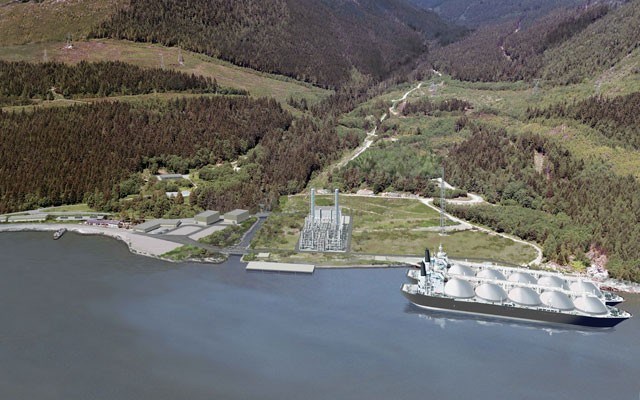The controversial Woodfibre LNG project in Squamish was granted a 40-year licence to export liquefied natural gas this week.
Ottawa announced the approval on Monday, June 5, with natural resources minister Jim Carr saying the licence provides "certainty for investors while creating jobs for Canadians as the world moves towards a low-carbon future."
In late 2013, the project received a 25-year licence to export approximately 2.1 million tonnes of LNG per year. But with the 2015 amendments to the National Energy Board's (NEB) regulations, the maximum export term was increased to 40 years. The annual export volume is expected to remain the same under the new licence.
"Now we have 15 more years of bringing economic opportunities to the District of Squamish and the surrounding area, as well as an opportunity to sell B.C. LNG to markets overseas, where it can be used to help reduce greenhouse gas emissions and improve air quality," said Jennifer Siddon of Woodfibre LNG.
With the licence extension, citizen group My Sea to Sky believes a new environmental assessment (EA) of the project should have taken place.
"The environmental assessment, and the issuance of the certificate, was based on a different level of impact. It was over 25 years, so now we're talking 60 per cent more gas, 15 additional years of polluting Howe Sound and an entirely different cooling system (will be put in place)," said Delena Angrignon, the group's regional coordinator. "The existing EA certificate should be made void. It's a whole different project now, in essence."
Siddon was quick to note that, despite the new 40-year term, all of the conditions and mitigation measures placed on Woodfibre by the federal government and the Squamish Nation will remain for the life of the project.
In its decision to grant the licence, the National Energy Board said the amount of natural gas proposed for exportation by Woodfibre is surplus to Canadian needs, and can accommodate "reasonably foreseeable demand" for LNG, as well as a "plausible potential increase in demand."
The project's detractors have pointed to the waning global appetite for LNG in recent years as proof that Canada should be investing more heavily in other forms of energy. Opponents have also questioned whether the Woodfibre project makes sense financially.
"I think there's a lot working against this project that makes us very hopeful, but as it stands right now, there is no customer, there is no financing and there's a glut in the marketplace," Angrignon said.
Analysts have predicted the LNG flooding the market — thanks in large part to new projects in Australia — makes it unlikely that any final investment decision on large LNG projects worldwide will come in the next two years. But in a February forecast, multinational oil company Shell said Asian demand for LNG has paced higher than anticipated. LNG imports in China this January, for instance, were up 40 per cent from the prior year.
"We know from our ownership and the business relationships they have that there is absolutely an interest in LNG in the Asian marketplace," noted Siddon.
Woodfibre came under scrutiny in the lead-up to last month's provincial election after it was discovered the B.C. Liberals had returned more than $56,000 in alleged illegal political donations to the company's VP of corporate affairs Byng Giraud and senior communications manager Marian Ngo.
Woodfibre has maintained the employees were upfront about their contributions, but Angrignon believes it's more bad optics for a company that has already spurred fierce opposition locally.
"This should stop the project, and we should be questioning everything, including why the NEB is approving all LNG projects for 40 years," she wrote in a follow-up email. "(The) integrity (of the process) is in question."




